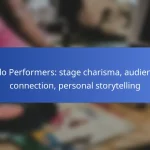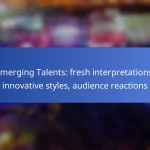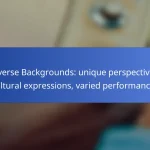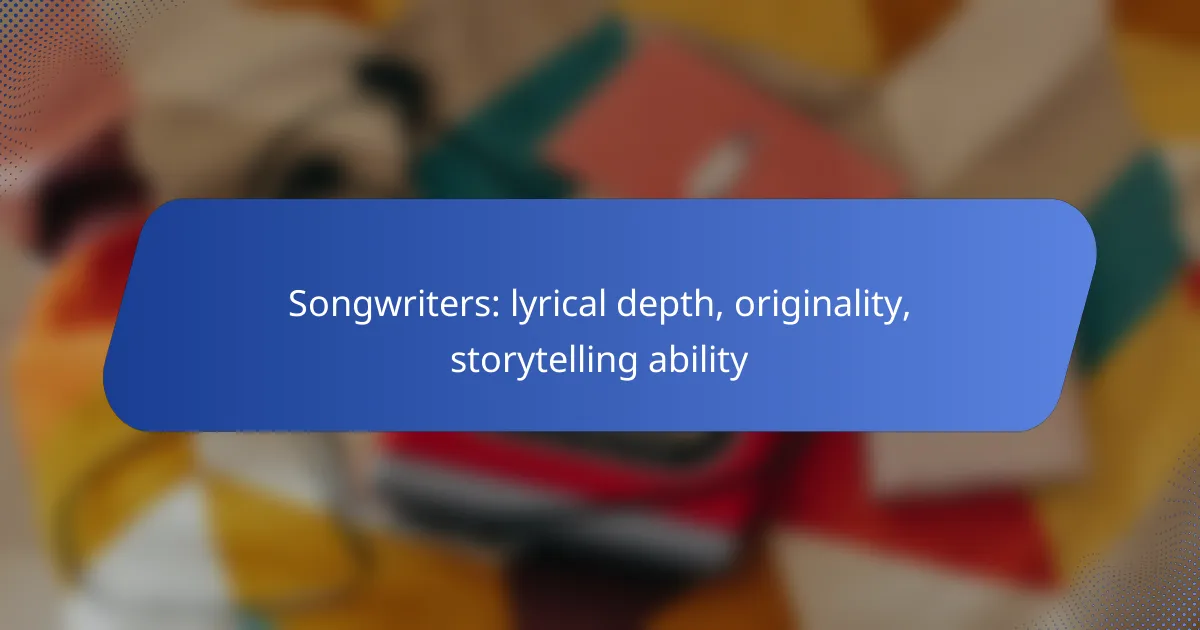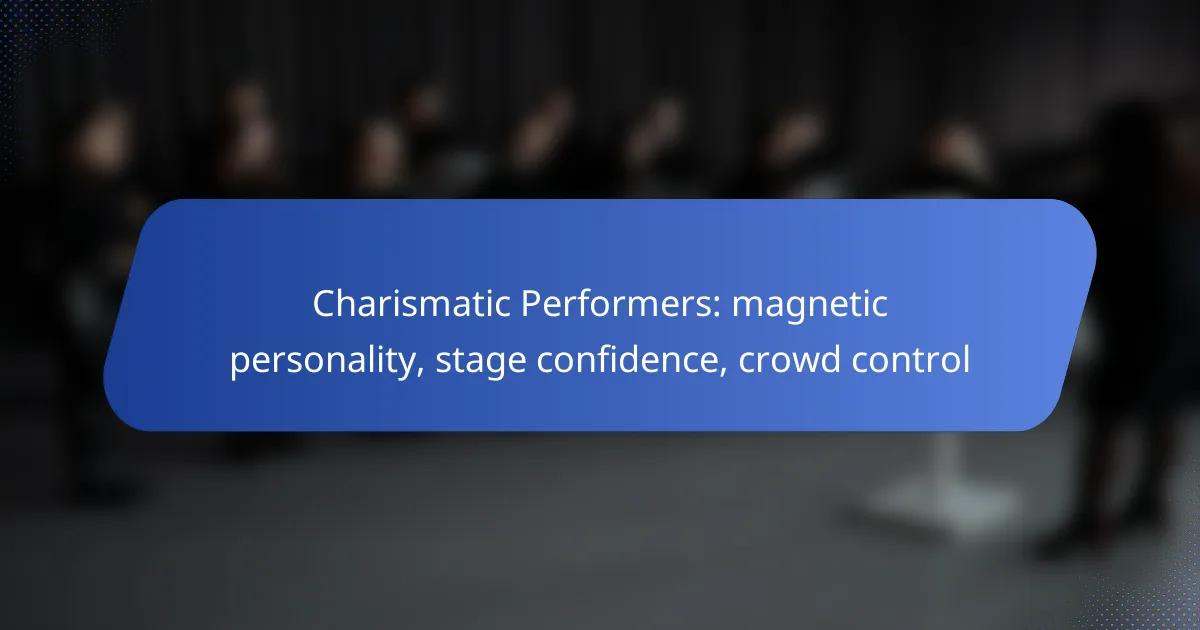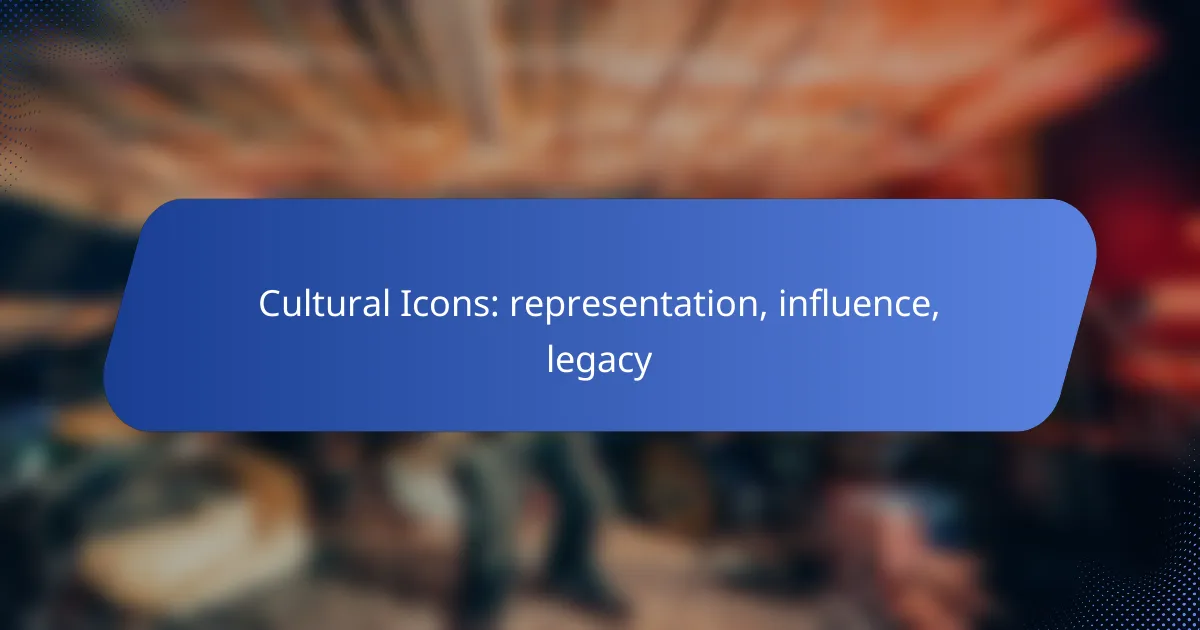Songwriters possess a unique ability to weave lyrical depth, originality, and storytelling into their music, creating a profound connection with listeners. By employing techniques such as metaphor and personal experiences, they enhance the complexity of their lyrics while presenting fresh ideas and perspectives. This artistry not only captivates audiences but also transforms songs into memorable narratives that resonate on a deeper emotional level.

How can songwriters enhance lyrical depth?
Songwriters can enhance lyrical depth by employing various techniques that add complexity and resonance to their lyrics. This involves using metaphor, drawing from personal experiences, and incorporating literary devices to create a richer narrative.
Utilizing metaphor and imagery
Metaphors and vivid imagery can transform simple lyrics into powerful expressions of emotion. By comparing abstract concepts to tangible objects or experiences, songwriters can evoke strong feelings and paint a mental picture for the listener.
For example, instead of saying “I’m sad,” a songwriter might say “My heart is a heavy stone,” which conveys deeper emotional weight. Aim to use fresh metaphors that resonate with your audience while avoiding clichés that can diminish impact.
Exploring personal experiences
Drawing from personal experiences allows songwriters to create authentic and relatable lyrics. Sharing real-life stories can connect with listeners on a deeper level, making the song more impactful.
Consider writing about significant moments in your life, whether they are joyful or painful. This authenticity can resonate with listeners who may have faced similar situations, fostering a sense of connection.
Incorporating literary techniques
Literary techniques such as alliteration, assonance, and rhyme schemes can enhance the musicality of lyrics. These elements not only make the song more enjoyable to listen to but also add layers of meaning and rhythm.
Experiment with different structures, such as varying line lengths or using repeated phrases, to create a unique lyrical flow. This can help maintain listener interest and emphasize key themes in your song.
Collaborating with other artists
Collaboration can bring fresh perspectives and ideas to a songwriter’s work. Working with other artists allows for the exchange of different styles and influences, which can enhance the lyrical depth of a song.
Consider co-writing sessions where each artist contributes their strengths, whether in melody, lyrics, or arrangement. This synergy can lead to innovative and unexpected results that enrich the final product.
Studying classic literature
Classic literature offers a wealth of themes, characters, and narrative techniques that can inspire songwriters. By studying the works of renowned authors, songwriters can gain insights into storytelling and emotional expression.
Reading poetry and novels can help identify effective ways to convey complex ideas succinctly. Incorporate elements from these works into your lyrics to create depth and engage listeners with thought-provoking content.

What are the key elements of originality in songwriting?
Originality in songwriting is defined by the ability to present fresh ideas and perspectives, creating a unique sound that resonates with listeners. Key elements include unique perspectives and themes, innovative song structures, distinctive vocal styles, and personal storytelling.
Unique perspectives and themes
Songwriters can achieve originality by exploring uncommon themes or presenting familiar topics from a new angle. This might involve addressing social issues, personal experiences, or cultural narratives that are often overlooked. For example, a song about love could focus on the complexities of unrequited feelings rather than the typical romantic tropes.
To develop unique perspectives, songwriters should reflect on their own experiences and consider how these can be woven into their lyrics. Engaging with diverse cultures and viewpoints can also inspire fresh themes that stand out in a crowded music landscape.
Innovative song structures
Breaking away from traditional song structures can enhance originality. While many songs follow a verse-chorus format, experimenting with different arrangements—such as varying the order of sections or incorporating unexpected transitions—can create a distinctive listening experience. For instance, a song might start with a bridge or feature a chorus that appears only once.
Songwriters should consider the emotional journey they want to take listeners on and structure their songs accordingly. Using unconventional time signatures or alternating between different musical styles within a single track can also contribute to a unique sound.
Distinctive vocal styles
A songwriter’s vocal delivery can significantly impact the originality of their music. Unique vocal styles, whether through tone, pitch, or phrasing, can make a song instantly recognizable. For example, an artist might employ a raspy voice or a soft falsetto to convey specific emotions that align with their lyrical content.
To cultivate a distinctive vocal style, songwriters should experiment with different techniques and find what feels authentic to them. Collaborating with vocal coaches or other artists can provide valuable feedback and help refine their sound.
Personal storytelling
Personal storytelling is a powerful tool for creating original songs. By sharing their own experiences, songwriters can forge a deeper connection with listeners. This could involve recounting pivotal life moments, struggles, or triumphs that resonate on a universal level.
When crafting personal narratives, songwriters should focus on authenticity and vulnerability. Using specific details and emotions can make the story more relatable, allowing listeners to see themselves in the lyrics. Keeping a journal of experiences and feelings can serve as a valuable resource for inspiration.
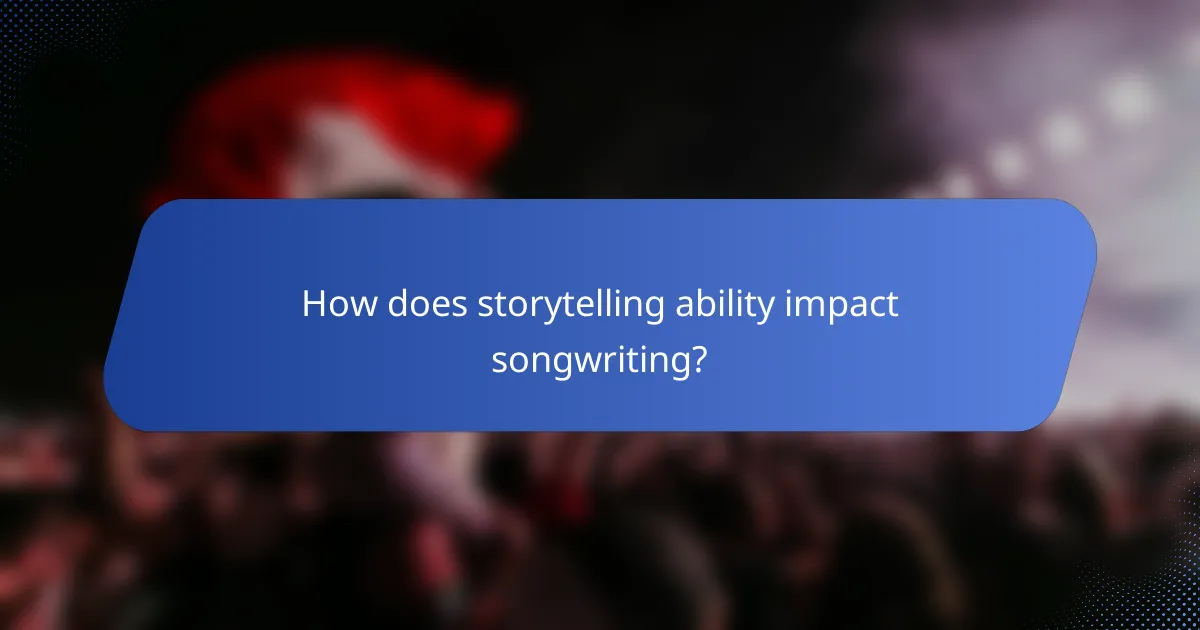
How does storytelling ability impact songwriting?
Storytelling ability significantly enhances songwriting by allowing artists to convey deeper meanings and emotions through their lyrics. A well-crafted narrative can resonate with listeners, making the song more memorable and impactful.
Creating emotional connections
Emotional connections are vital in songwriting, as they draw listeners into the narrative. When songwriters infuse personal experiences or relatable themes into their lyrics, they foster a sense of empathy and understanding. For instance, a song about heartbreak can evoke feelings of sadness and nostalgia, making it resonate with anyone who has experienced similar emotions.
To strengthen emotional ties, songwriters should focus on specific imagery and sensory details that evoke feelings. Using metaphors and similes can also enhance the emotional depth of the lyrics, allowing listeners to visualize and feel the story being told.
Building narrative arcs
Building a narrative arc is essential for creating a compelling song. A strong narrative typically includes a beginning, middle, and end, guiding listeners through a journey. For example, a song might start with a moment of conflict, develop through a series of challenges, and conclude with resolution or reflection.
Songwriters can enhance their narrative arcs by incorporating tension and release, which keeps listeners engaged. Using varying tempos and dynamics can also reflect the emotional highs and lows of the story, making the overall experience more dynamic and captivating.
Engaging listeners through characters
Engaging listeners through characters allows songwriters to create relatable figures that embody the song’s themes. By developing distinct characters, songwriters can explore different perspectives and emotions, making the narrative more relatable. For instance, a song might feature a protagonist facing a dilemma, allowing listeners to connect with their struggles.
To effectively engage listeners, songwriters should provide enough detail about each character to evoke empathy. This can include their motivations, fears, and desires, which help listeners invest emotionally in the story. Crafting dialogue or inner thoughts can also add depth, making the characters feel more real and relatable.
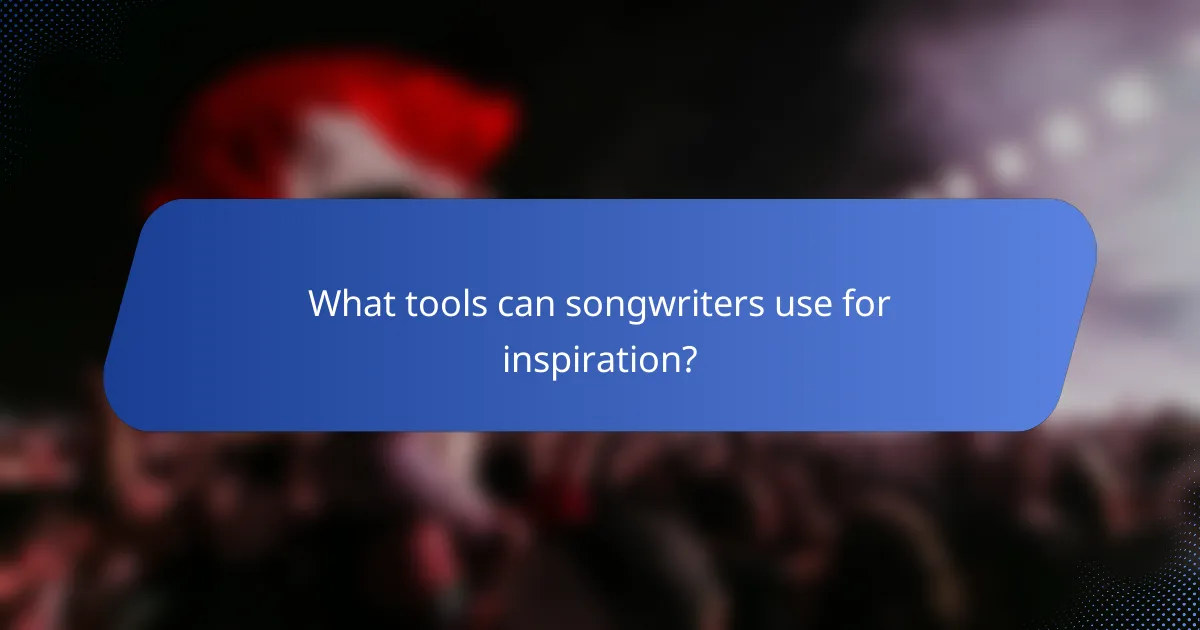
What tools can songwriters use for inspiration?
Songwriters can utilize various tools to spark creativity and enhance their lyrical depth, originality, and storytelling ability. These tools range from specialized apps to educational resources and collaborative workshops, each offering unique benefits to help songwriters refine their craft.
Songwriting apps like Songwriter’s Pad
Songwriting apps such as Songwriter’s Pad provide a digital space for lyricists to organize their thoughts, melodies, and ideas. These apps often include features like rhyme dictionaries, chord progressions, and prompts that can help overcome writer’s block. Many are user-friendly and accessible on mobile devices, allowing songwriters to jot down inspiration anytime, anywhere.
When choosing an app, consider your specific needs. Some apps focus on lyric writing, while others may emphasize melody creation or collaboration. Look for features that align with your songwriting style to maximize your productivity.
Online courses from Berklee College of Music
Online courses from Berklee College of Music offer structured learning experiences for aspiring songwriters. These courses cover various aspects of songwriting, including lyric writing, composition, and music theory, providing valuable insights from industry professionals. Participants can learn at their own pace, making it convenient for those balancing other commitments.
Investing in a course can enhance your skills significantly. Look for courses that include feedback from instructors or peer reviews, as this can provide critical perspectives on your work. Many courses also offer certificates that can enhance your credentials in the music industry.
Workshops with established songwriters
Participating in workshops with established songwriters can be an invaluable experience for honing your craft. These workshops often provide hands-on learning opportunities, allowing you to collaborate with experienced artists and receive direct feedback on your work. Engaging with others in a creative environment can also inspire new ideas and approaches to songwriting.
When seeking workshops, consider those that focus on your specific genre or style. Networking with fellow songwriters and industry professionals during these sessions can lead to future collaborations and opportunities. Look for workshops that offer a mix of instruction and practical exercises to maximize your learning experience.

What are the prerequisites for effective songwriting?
Effective songwriting requires a blend of lyrical depth, originality, and storytelling ability. These elements help create songs that resonate with listeners and convey meaningful messages.
Lyrical Depth
Lyrical depth involves crafting words that evoke emotions and provoke thought. Songwriters should focus on using vivid imagery, metaphors, and relatable themes to connect with their audience. For instance, exploring universal experiences like love, loss, or personal growth can enhance the emotional impact of a song.
To achieve lyrical depth, consider writing from personal experiences or observations. This authenticity can lead to more compelling lyrics. Additionally, studying poetry can provide insights into effective word choices and structures that elevate lyrical content.
Originality
Originality in songwriting means creating unique melodies and lyrics that stand out in a crowded music landscape. It’s essential to develop a distinctive voice and style that reflects personal influences while avoiding clichés. Experimenting with different genres or blending styles can lead to innovative musical expressions.
Songwriters can foster originality by keeping a journal of ideas, phrases, or concepts that inspire them. Regularly challenging oneself to write outside of comfort zones can also spark creativity and lead to fresh perspectives in songwriting.
Storytelling Ability
Storytelling ability is crucial for engaging listeners and making songs memorable. A well-told story can draw the audience in, creating a connection that enhances the overall experience. Effective storytelling often includes a clear narrative arc, relatable characters, and emotional stakes.
To improve storytelling in songwriting, outline the song’s narrative before writing. Identify key moments and emotions to convey, ensuring that each verse and chorus contributes to the overall story. Listening to songs known for their storytelling can provide valuable lessons in structure and delivery.
